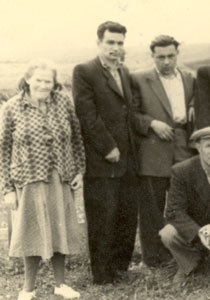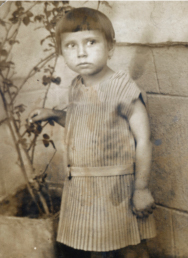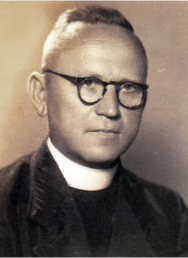
Judel Ronder
Keidaniai, LithuaniaInterviewed in Vilnius in 2005 by Zhanna Litinsksaya
Read the biography
View the family pictures here.
“I still remember that moment, the way I felt, my eyes streaming with tears from the warmth he demonstrated.”
When I began my studies at the lyceum, it seemed to me I was the unluckiest guy in the universe, mainly because it was not a co-ed school and the girls were studying separately. There were nine Jews out of 32 students in the class.
There was an ardent antisemitism, which was, I have to say, implicitly encouraged by the teachers. We were teased, humiliated, and bullied. My classmate, a boy named Gelsburg, was so beaten that he had to keep to bed for two months. Nobody was punished; usually after such cases the principal said that all of us had to calm down without saying who was to be blamed.
By the late 1930s there was an antisemitic atmosphere in both Polish and Lithuanian educational institutions—and my lyceum was a Lithuanian one. All the Jewish students had to take separate desks, where they were supposed to be segregated from everyone else, but in some educational institutions certain students and administrators were strongly against this kind of discrimination.
In our school there were some very strong antisemites. During the Lithuanian lesson one of these Lithuanians got up and said, “We, the Lithuanians, are not willing to sit with kikes!” The teacher agreed with him and we Jewish boys had to move over to the left side of the classroom.
Then, one of the students, a Lithuanian Pole by the name of Katkyavichus, stood up, took his schoolbooks, and came and sat with us without saying a word. I still remember that moment, the way I felt, my eyes streaming with tears from that warmth he demonstrated.
I remembered that guy in my hardest days — when I was in the trenches fighting in the war. That reminiscence made me stronger. Katkyavichus remained in our city both during the Soviet and Fascist occupations, but he did not stigmatize himself with anything anyone could ever say was wrong. After the war he became the chairman of the physical training committee at a school. I met him often—whenever I came to town. We remained loyal friends our entire lives.
Judel Ronder and his family tried to escape Lithuania when the Germans invaded. He and his brothers managed to get away; the rest of their family did not. Judel fled into the Soviet Union, joined the Soviet Army and fought on the front lines for more than a year. After the war, he married and became an attorney for a shoe manufacturer in Kaunas.
BULLYING STORIES

“It’s something that never leaves you. It’s something you never forget, no matter how long you live.”
STANDING UP STORIES

“The priest gave me a Christian name for my false papers. I’ve kept it ever since because he didn’t just give me a name, he gave me a life.”